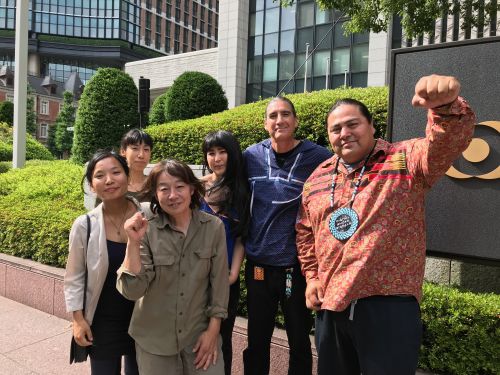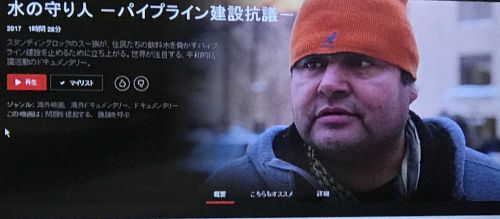News | May 30th, 2018

TOKYO, JAPAN – When law enforcement took over the camps outside of Standing Rock in February 2017, many activists promised the fight was not over.
Nearly a year and a half after the last tent was pulled down, billions of dollars have been divested from banks associated with the controversial Dakota Access Pipeline. The pipeline’s parent company, Energy Transfer Partners, fast tracked permits to run the 1,172-mile pipeline on land that once belonged to the Standing Rock Sioux Nation to push an oil pipeline under the Missouri River.
A prominent activist involved in the fight travelled to Tokyo this month after being invited to speak on why Japanese banks should divest from supporting the pipeline. On May 28, Myron Dewey, founder of Digital Smoke Signals, met with the first of three banks, Tokyo Mitsubishi UFJ Bank, and said the meeting went well. Indigenous rights attorney, William Patrick Kincaid, of the Cheyenne Nation, also spoke with bank representatives.
“International divestment is gaining momentum,” Dewey, a Native journalist and filmmaker, said. “They agreed to meet and listen, which is a huge step.”
The meeting occurred after an 11,000-signature petition was sent to three banks. The Ainu tribe from Japan, and the Maori people in New Zealand, were included in the petition. Dewey and Kincaid also plan on speaking with representatives from the Mizuho Bank and the Sumitomo Mitsui Financial Group, who together with MUFJ contributed $1.5 billion to the $3.8 billion pipeline.
“These banks are signatories to the Equator Principal which the DAPL pipeline project they are funding violates on three accounts: environmental, occupational, and social,” a press release stated.
A documentary film Dewey created called “Awake,” which is currently featured on Netflix, has also been translated into Japanese.

Two Norway banks already withdrew financial support from the pipeline in 2016. In February 2017, the city of Seattle voted unanimously to establish an ordinance barring local government from doing business with Wells Fargo, an investor of the Dakota Access Pipeline.
The San Francisco Board of Supervisors also passed a resolution for the city to setup a special screening process to discover companies with ties to DAPL, which make up about 12 percent of the city’s portfolio.
A year ago, California cities Davis and Santa Monica also pledged to drop future banking contracts with Wells Fargo. Davis withdrew $124 million, and Santa Monica took its $1 billion account elsewhere, according to media reports.
A total of $4.3 billion has already been divested from banks affiliated from the Dakota Access Pipeline, according to DefundDAPL, an organization focused on pulling financial support from the pipeline. Wells Fargo, Citibank, Chase, Bank of America, Mizuho, Goldman Sachs, Deutsche Bank, Scotiabank, SunTrust, TD, Credit Agricole, RBC, and HSBC are still listed as active investors.
Governor Doug Burgum wants Bakken oil business to do better, and has set a high goal two million barrels of oil to be drilled every day. Protests simmered and died after President Trump’s Administration signed one executive order after another greenlighting oil drilling and pipeline building, but many cases from the Dakota Access Pipeline controversy have been dismissed by state prosecutors.
Officially, 761 people were arrested during the months-long opposition to the Dakota Access Pipeline, and as of July 2017, 114 cases had been dismissed by the state. Eleven people received guilty verdicts; 50 pleaded guilty – primarily on lesser charges -- and three have been acquitted.
Dewey, a Paiute-Shoshone from the Walker River Paiute Tribe and Temoke Shoshone in Nevada, walked free of a stalking charge that stemmed from the 2016 protests after Morton County prosecutors dropped the charge against him.
The city of Fargo has had a long-term relationship and has received favorable rates from Wells Fargo, Mayor Tim Mahoney said.
“We’ve done banking with Wells Fargo for quite some time, and they have our $200 million loan for the diversion, so it would be difficult,” Mahoney said. “Right now, it’s more of a business relationship we have, it would be extremely difficult to walk away from that.”
Although the relationship is complicated, it’s not something Mahoney would object to discussing, if brought before the city’s commission, he said.
“We could talk to them about it,” Mahoney said. “We’re working well with the bank we’re dealing with right now. I would have to see what the city commissioners would want to do about it, but no one has brought it to our attention.”
February 16th 2026
January 27th 2026
January 27th 2026
January 26th 2026
January 24th 2026



_(1)__293px-wide.jpg)

_(1)_(1)_(1)_(1)_(1)__293px-wide.jpg)